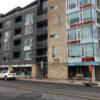The number of contested hearings at the Ontario Municipal Board involving the City of Ottawa has dropped significantly since 2015. While the city chalks up the sharp decrease to improved relations between the municipality and developers, industry stakeholders say there’s been less development lately, and therefore, less to appeal.
The OMB is a provincial tribunal that can overrule municipal planning decisions following appeals by individuals, community associations, developers and builders.
In 2015, there were 19 contested hearings at the OMB involving the City of Ottawa. That dropped to 11 in 2016, and fell to just six this year, an overall decrease of roughly 68 per cent.
(Sponsored)

How Carleton is using simulation and visualization to improve training, design and human performance
From healthcare to aviation to architecture, simulation and visualization tools have become an essential part of training, analysis and decision-making in sectors that rely on precision. At Carleton University, researchers

‘Prenup of business law’: Reasonable expectations in shareholder disputes
The scenario: You’re a 60 per cent shareholder. Your business partner holds the other 40 per cent. And you’ve just found a third party who wants to buy you out.
According to Steve Willis, the city’s general manager of planning and economic development, the decrease can be traced to a “more collaborative approach” to infill from members of council, the public, city staff and applicants.
That’s not what Dean Karakasis, executive director of the Building Owners and Managers Association Ottawa chapter, has seen in recent years.
“We don’t really see any big difference in terms of how the city has been handling things,” he tells OBJ.
Mr. Karakasis does agree that communication with the city has been strong in recent years, but says that any changes to the processes or policy that have been discussed have yet to come into effect.
Instead, his view of the city’s commercial real estate sector provides a simpler explanation for the drop in OMB activity.
“There is a little less development going on right now. There’s less things to appeal over.”
– Dean Karakasis, executive director of BOMA Ottawa
“There is a little less development going on right now. There’s less things to appeal over,” he says.
Commercial development has slowed in the past few years, Mr. Karakasis says, offering fewer opportunities for controversy or conflict.
On the residential side, the Greater Ottawa Home Builders Association’s John Herbert agrees with Mr. Karakasis’s thinking.
“It’s a direct result of the condominium collapse,” he says.
Education and specificity could reduce conflict
For a period of about 10 years before 2014, Mr. Herbert says a boom in the condo market increased the number of projects flowing through City Hall. Driven by the city’s official plan’s explicit focus on intensification, these projects could become magnets for community opposition.
“Change can be a very emotional thing for people who have lived in a neighbourhood … for a number of years,” he says. “Anything that is proposed can have a fairly significant impact on them.”
The drop in OMB hearings, then, can be correlated to drops in condo development proposals these past two years.

While Mr. Herbert understands the fears surrounding potential neighbourhood disruption, he says increased education on the city’s part might help reconcile disconnects between the official plan and residents’ intensification fears.
“I think it would still help to educate people as to how many of their concerns will never materialize,” he says.
Mr. Karakasis also points to the city’s official plan as a source of conflict. It would help his members, he says, to provide a bit more specificity about the kinds of projects the city wants done.
“You’ve got this constant tug of war between, ‘Oh, we’d really like the industry to do creative things to make our city interesting, but we want this certainty that everybody knows 100 per cent what you’re doing,’” he says.
“It’s all about understand what the needs are upfront so we can accommodate them.”
– With files from Peter Kovessy




